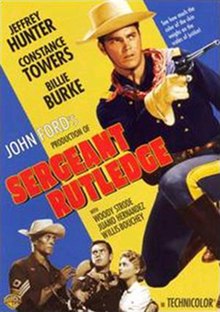Sergeant Rutledge
| Sergeant Rutledge | |
|---|---|
 | |
| Directed by | John Ford |
| Written by | James Warner Bellah Willis Goldbeck |
| Produced by | Willis Goldbeck Patrick Ford |
| Starring | Jeffrey Hunter Woody Strode Billie Burke |
| Cinematography | Bert Glennon |
| Edited by | Jack Murray |
| Music by | Howard Jackson |
Production company | John Ford Productions |
| Distributed by | Warner Bros. |
Release date |
|
Running time | 111 minutes |
| Country | United States |
| Language | English |
Sergeant Rutledge is a 1960 American Technicolor Western crime film starring Jeffrey Hunter, Woody Strode and Billie Burke[1] It was directed by John Ford and shot on location in Monument Valley, Utah.
The film starred Strode as a black first sergeant in the United States Cavalry accused of the rape and murder of a white girl at a U.S. Army fort in the late 1880s.[2]
Plot
The film revolves around the court-martial of 1st Sgt. Braxton Rutledge (Strode), a "Buffalo Soldier" of the 9th U.S. Cavalry. His defense is handled by Lt. Tom Cantrell (Hunter), Rutledge's troop officer. The story is told through a series of flashbacks, expanding the testimony of witnesses as they describe the events following the murder of Rutledge's Commanding Officer, Major Dabney, and the rape and murder of Dabney's daughter, for which Rutledge is the accused.
Circumstantial evidence suggests that the first sergeant raped and murdered the girl and then killed his commanding officer. Worse still, Rutledge deserts after the killings. Ultimately, he is tracked down and arrested by Lt. Cantrell. At one point, Rutledge escapes from captivity during an Indian raid, but later, he voluntarily returns to warn his fellow cavalrymen that they are about to face an ambush, thus saving the troop. He is then brought back in to face the charges and the prejudices of an all-white military court.
Eventually he is found not guilty of the rape and murder of the girl when a local white man breaks down under questioning and admits that he raped the girl.
Cast
- Jeffrey Hunter as 1st Lt. Tom Cantrell, 9th Cavalry (counsel for the defense)
- Constance Towers as Mary Beecher
- Billie Burke as Mrs. Cordelia Fosgate
- Woody Strode as First Sergeant Braxton Rutledge, 9th Cavalry
- Juano Hernández as Sgt. Matthew Luke Skidmore, 9th Cavalry
- Willis Bouchey as Lt. Col. Otis Fosgate, 9th Cavalry (president of the court-martial)
- Carleton Young as Capt. Shattuck, 14th Infantry (prosecutor)
- Judson Pratt as 2nd Lt. Mulqueen, 9th Cavalry (court-martial board member)
See also
References
- ^ Harrison's Reports film review; April 16, 1960; page 64.
- ^ Ford's use of the 9th was in error. At the time of the story, with Gen. Nelson A. Miles in command, the Buffalo Soldiers of the 10th U.S. Cavalry served in Arizona. The 9th Cavalry was stationed in West Texas, New Mexico, Kansas, and Nebraska, but never Arizona.
External links
- Sergeant Rutledge at IMDb
- Sergeant Rutledge at AllMovie
- Sergeant Rutledge at Rotten Tomatoes
- DVD Review Review of the film at Vista Records
